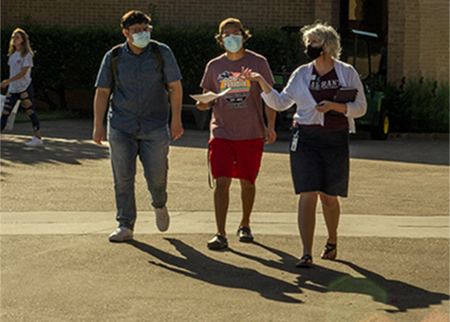Logan Evans
managing editor
As nearly three semesters of virtual learning give way to an in-person Fall, TCC instructors prepare for a return to form and reflect on the lasting changes the pandemic will bring to their classrooms.
“It’s definitely uncharted territory and new beginnings,” NE history professor Chloe Northrop said.
Northrop, who had a baby during quarantine, feels strong empathy for students hesitant to return. While she is 35, healthy and vaccinated, other members of her family are severely more at-risk.
Northrop’s grandmother, who often takes care of her infant child, is 84 — well into the most vulnerable age group for COVID-19. On top of that, her sister contracted a breakthrough case of the virus after being vaccinated.
“Voting is the way your voice is heard. You must vote for the future you want.”
Jay Adkins
SE associate professor of music
These close-to-home factors have given Northrop an acute sense of the anxiety many students face as cases in Texas continue to rise. Going forward, she plans to record her on-campus lectures for students who may need to stay home from classes.
“I don’t want them to take unnecessary risks because of a harsh attendance policy,” she said. “At TCC, we need to listen to what our students need. I want to make sure I’m meeting those needs, which are incredibly diverse.”
The addition of virtual alternatives to in-person courses is an unexpected but welcome element to the post-virtual semester, NW associate professor of Spanish Mayra Fuentes said.
“I think the organization online learning forced us to have is going to be very beneficial,” she said. “It’s not something we can just get rid of.”
Still, Fuentes is excited about the connection that returning face-to-face will bring — a connection that was lost while teaching a subject like language which relies on interpersonal communication.
“Most of the faculty here are in this field because we’re passionate about what we teach and we love interacting with the students,” she said. “So having that conversation and expanding their way of thinking — we’re craving that.”
For Jay Adkins, SE associate professor of music, the upcoming semester is all about rebuilding. Most of his students who were enrolled in a two-year music program at the start of the pandemic have either graduated or moved on in the two semesters since last meeting.
“We’re having to recruit and start over,” he said.
Like Fuentes’ experience with teaching a foreign language online, Adkins found that playing music virtually pales in comparison to playing together in person. Music — like language for Fuentes — is built on personal connection for Adkins.
While Adkins plans to incorporate virtual elements like listening assignments into his courses, he looks forward to recapturing the connection with his students that only face-to-face instruction can bring.
“You appreciate the students in the room more,” he said. “It’s something you take for granted, that one-on-one relationship that you get in the same room.”

